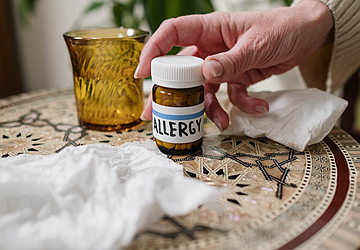health
Millions of people worldwide suffer from episodic hypersensitivities, also known as hay fever or rhinitis. The amount of pollen in the air fluctuates with the seasons, causing sneezing, congestion, itching, and other unwelcome symptoms. In this thorough article, we will examine different handling mechanisms, examine the root causes of episodic hypersensitivities, and offer compelling justifications for using these tactics.
Understanding Episodic Hypersensitivities
The body's immune response to tree, grass, and weed pollen is the main cause of episodic hypersensitivities. The immune system perceives these agents as dangerous intruders when they enter the body and release histamines to combat the perceived threat. These histamines are the culprits behind typical symptoms like runny nose, itchy eyes, and sneezing.
10 Effective Handling Strategies for Episodic Hypersensitivities
The following ten steps will assist you in effectively controlling and handling episodic hypersensitivities:
1. Keep Up with Pollen Counts
Follow local news, weather apps, or websites with sensitivity forecasts to stay informed about pollen counts in your area. You can use this information to make plans for your outdoor activities on days with lower pollen counts.
2. Limit Outdoor Time During Pollen Peak Hours
Early morning and late afternoon are typically when pollen counts are at their highest. Plan your outdoor activities for midday, if you can, when pollen counts are at their lowest.
3. Make Your Home a Pollen-Free Zone
Your home should have designated pollen-free zones in certain areas. When pollen counts are at their highest, keep windows closed, use air purifiers with air filters, and think about covering pillows and mattresses with agents-proof covers.

4. Maintain Good Hygiene
After being outside, make it a habit to change into clean clothes, take a shower, and wash your hair to get rid of any pollen that may have accumulated on you.
5. Use Products to Relieve Hypersensitivities
Antihistamines, decongestants, and nasal corticosteroids sold over the counter can relieve symptoms. To determine the best choice for your requirements, speak with your doctor or pharmacist.
6. Try Nasal Irrigation
Using a saline nasal rinse can help clear pollen and other irritants from your nasal passages, which will lessen congestion and relieve symptoms.
7. Put on Protective Gear
When working or spending time outside, think about donning pollen-blocking sunglasses and a pollen mask to avoid inhaling agents.
8. Keep Your Home Clean
To reduce indoor agents, regularly clean your home. Use a vacuum with a HEPA filter to clean the carpets, upholstered furniture, and curtains. Use a damp cloth to dust surfaces to stop agents from spreading into the air.
9. Stay Hydrated and Eat a Healthy Diet
Your immune system can be supported, and inflammation reduced by drinking plenty of water and eating a balanced diet high in fruits, vegetables, and fatty acids, which may lessen the severity of reactions.
10. Speak with a Doctor
If you have severe hypersensitivities or they have a big impact on your quality of life, you might want to see a doctor. In addition to recommending individualized treatment options like prescription medications or immunotherapy, they can perform tests to identify particular agents.
Persuasive Arguments for Handling Strategies
The following are the top 10 reasons to adopt handling mechanisms to treat episodic hypersensitivities:
1. Improved Quality of Life
Imagine being able to fully enjoy picnics, hikes, and outdoor activities without having to deal with sneezing fits or itchy eyes all the time. By using handling mechanisms, you can be free to appreciate each moment and transform potentially unpleasant experiences into pleasant ones.
2. Increase Your Productivity
Hypersensitivities can make you feel exhausted, congested, and unfocused. You can unleash your potential to be more focused, energetic, and productive in both your personal and professional endeavors by effectively managing your hypersensitivities.
3. Long-Term Health Advantages
Consider handling mechanisms as a medical investment. You may be able to avoid the onset of more serious conditions like chronic sinusitis or even asthma by limiting your exposure to agents and promptly treating symptoms.
4. Financial Common Sense
Handling techniques like keeping a clean home or using air purifiers may appear to be extra costs. However, these methods can actually end up saving you money over the long run when compared to the costs of doctor visits, medications, and lost workdays as a result of severe symptoms.
5. Knowledge Gives You Power
Acquiring knowledge of your triggers and the best ways to deal with them gives you the power to take charge of your physical strength. When you are well-informed about handling mechanisms, you can make wise decisions and fight for your well-being.
6. Freedom to Explore
Resist the urge to let episodic hypersensitivities control your schedule. With the right strategies, you can travel, enjoy outdoor activities, and participate in activities that you might have otherwise avoided because of hypersensitivities.

7. Reducing Medication Dependence
While taking medications regularly can bring about relief, doing so can result in dependency and possible side effects. By incorporating handling mechanisms, you might be able to reduce your reliance on medications and the negative effects that come with them.
8. Strengthened Relationships
Hypersensitivities can affect your interactions with loved ones by lowering your mood and energy. You can improve your social interactions, your relationships, and the memories you make by taking control of your hypersensitivities.
9. Taking Advantage of All Seasons
Every season offers its own special opportunities and natural beauty. Using handling mechanisms enables you to enthusiastically embrace each season because you know that you have the tools to lessen reactions and make the most of every opportunity.
10. Self-Care and Self-Respect
Making your well-being a priority by using handling mechanisms is a sign of self-care and respect for yourself. By taking action to control your hypersensitivities, you are sending a message to yourself and those around you that your condition and comfort are important.
Conclusion
Episodic hypersensitivity management calls for a multifaceted strategy. You can significantly lessen the impact of agents on your daily life by being aware of the causes of hypersensitivities, implementing sensible handling mechanisms, and thinking outside the box. You will not only get immediate relief, but you will also be making an investment in your long-term wellness. Adopt these tactics, make wise decisions, and reclaim your ability to take full advantage of each season.








